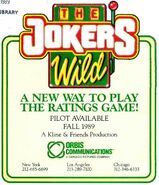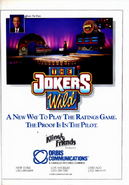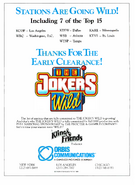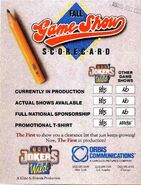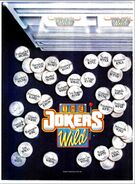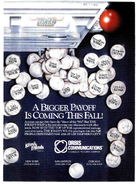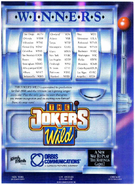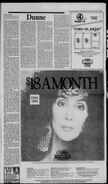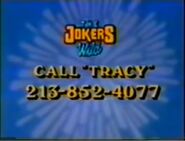| Aired | |
| Pilot: 1989 Syndicated, September 10, 1990 - March 8, 1991 | |
| Run time | |
| 30 Minutes | |
| Host | |
| Pat Finn | |
| Announcer | |
| Bob Hilton (Pilot) Ed MacKay (Series) | |
| Origination | |
| Studio 33, CBS Television City, Los Angeles, California | |
This is chronicling the short-lived syndicated 1990 version of The Joker's Wild. This version was co-produced by Kline & Friends and distributed by Orbis Communications.
Game Format[]
Three contestants competed. The questions were all words, phrases and names and the contestants' job is to come up with a definition or the meaning of the clue. The game always began with a toss-up question for control of the joker machine. The joker machine consists of dollar amounts, a Joker, or other elements. Each spin decides the value of each clue. Correct answers earned money and answered another clue. One mistake caused the opponents to buzz-in and steal the money & control by answering the same clue.
The first player to reach a set goal ended the round, and the two survivors of round one moved on to round two. There, the dollar amounts increase, and the first to reach another set goal moved on to the bonus game.
Pilot[]
The champion went first, and the first two windows contained amounts from $0-$50 in Round 1, and $0-$70 in Round 2, while the third window had these elements:
- Time limits from 15 seconds (:15) to one minute or 60 seconds (1:00). If the player could survive the time limit, they kept their turn.
- (opponent's) SPIN - Meaning that control would pass over to the opponent who's name came up.
- JOKER - When it came up, the player in control had a choice between going for a "Joker's Jackpot" of $1,100 by defining five difficult words or go for double value along with a 30 second time limit. Missing a clue on either part did not forfeit control; the jackpot acted as a bonus as it had no effect on the final score.
The first player to reach $500 ended the round, and the first to $1,500 won the game.
Series[]
The show had two formats during its season-long run, with the show reverting to the first one towards the end of the run.
Format #1[]
In the series, time limits were removed; the player only had three seconds to answer before an opponent could buzz in. This time, if a joker appeared, the value of the first two windows was tripled and the player in control had 15 seconds to answer as many clues as he/she can for the tripled value, with an incorrect answer stopping progress.
Round 1[]
In the first round all clues were general knowledge. To start, a jump-in clue was given and the first player to buzz-in with a correct answer won control of the joker machine and the clues. In this round, the amounts on the wheels ranged from $5-$50 (maximum of $300). As with the pilot, the first player to reach $500 or more advanced to round two with the second place player, while the third place player was eliminated from the game and left with parting gifts.
Round 2[]
In round two, dollar values ranged from $10-$75 (maximum of $450) and the player in control had a choice of two categories for which they must answer clues from. Plus, there was an "Opponent's Choice" space on the third wheel in addition to the joker, which is just what it sounds like; when landed on, the opponent got to decide the subject. The first player to reach $2,000 or more won the game and kept the money, while the loser left with parting gifts.
Format #2[]
This time, up on the wheels were categories, and the joker can appear in all three windows. Like the title says, the jokers were wild, and the player in control can match it up with any category shown. Values were determined by how many of that category appeared.
Three different categories was worth $25 an answer. If a pair and a single category game up, the contestant could pick the single for $25 or the pair for $50. If three of a kind came up, each answer was worth $100. Should three jokers appear in any spin, that contestant was automatically awarded $250 to his/her score, plus a choice of three categories behind the jokers for $100/clue.
Round one was basically the same, except that it now took $1,000 to end the first round; excluding "Opponent's Choice", the second round was played exactly under the same perimeters.
Tie-breaker[]
In either format, if at the end of round 1, the first player reached their target score and the other two players were tied for second place, then each player will be asked as many general knowledge clues as they can. Whoever had the most correct answers won the right to move on to the second round.
Bonus Round[]
To start, the champion was given 60 seconds to guess as many words as he/she could, all starting with the same letter. Host Pat would give a maximum of three definitions and the player had to give the correct word to the definitions. If the player didn't know the answer, he/she could pass. Each correct answer earned the player one spin of the joker machine; When time ran out, the player then took the number of spins earned to the joker machine. The wheels this time contained prizes, cash amounts ranging from $500-$2,000 and jokers. The object was to get three of a kind of any prize. After each earned spin, the player had the option of freezing windows containing a prize they wanted to win. For future turns, only the unfrozen windows continued to spin.
Jokers could be used to match any prize showing; spinning three jokers (that's Joker, Joker, JOKER!) won the Joker's Jackpot that started at $5,000 and increased by $500 each time until won. However, this could only be done in one spin, as jokers could not be frozen and had to be converted into prizes on the board when shown individually. The highest Joker's Jackpot ever won was $36,000.
In the pilot, the definitions half of the bonus was played with changing letters. For the Joker Machine part, the winning contestant did not have to stick with the same prize for the remainder of the round; she or he was allowed to swap the frozen prize for a different prize, which featured amounts up to $5,000. And getting three jokers won a brand new car, which was never offered in the series.
Trivia[]
When Pat Finn was hosting the show, it was Richard S. Kline's call for him to be wearing glasses. He thought Finn would be highly intelligent, as far as his appearance on the show.
Stations []
Stations that aired the revival included:
- New York – WNBC
- Los Angeles – KCOP (which dropped it after six weeks on the air on 10/15/1990)
- Chicago -- WMAQ (which dropped it after nineteen weeks on the air on 1/21/1991)
- Philadelphia – KYW
- San Francisco – KRON
- Boston – WBZ (the station aired the show at 4:00 pm to start with, but after about a month, it got moved to about 2:30 am. Later, it hit 3:30 PM, and then finally at 11:30 am)
- Houston -- KPRC (the station yanked it from its 2:30 p.m. time slot from Sept 10, 1990 - Jan 7, 1991 to 2:00 a.m. and replaced it with the second half of Live with Regis and Kathie Lee)
- Dallas/Fort Worth - KDFW (which dropped it after eight weeks on the air on 10/29/1990)
- Phoenix -- KPHO
- Minneapolis – KARE
- Miami – WSVN
- Orlando -- WESH
- San Diego -- KGTV
- Cincinnati -- WKRC
- Seattle – KSTW (which dropped it after six weeks on the air on 10/15/1990 in favor of Love Connection)
- St. Louis – KTVI
- Cleveland -- WJW (the station aired the show at 4:00 pm to start with, but after about three months, it got moved to about 10:00 am, then finally at 1:30 am)
- Pittsburgh - WPXI
- Indianapolis -- WTHR
- Baltimore – WBAL
- Kansas City – WDAF (which dropped it after three months on the air on 12/10/1990 and replaced it with the first half of Highway to Heaven)
- Milwaukee – WTMJ (the station aired at 10:30am to start with, but after about four months, it got moved to about 2:10am, and then finally at 2:40am)
- Norfolk - WTKR
- Rochester, NY – WHEC (which dropped it after twenty six weeks on the air on 3/8/1991 in favor of the first half of Geraldo Rivera's talk show)
- Des Moines – WHO (the station yanked it from its 11:30 a.m. time slot from Sept 10, 1990 - Jan 21, 1991 to 1:00 a.m.)
- Cedar Rapids – KDUB
- Madison -- WISC (the station yanked it from its 6:30 p.m. time slot from Sept 10, 1990 - Jan 14, 1991 to 5:00 a.m. and replaced it with M*A*S*H reruns)
- La Crosse -- WLAX
- Eau Claire -- WEUX
- Honolulu - KGMB (which dropped it after eleven weeks on the air on 11/25/1990)
- Louisville - WHAS (the station yanked it from its 11:00 a.m. time slot from Sept 10, 1990 - Jan 7, 1991 to 2:05 a.m. and replaced it with The People's Court)
- Albany, NY - WNYT
- Mobile, AL - WKRG
- Detroit - WJBK (which dropped it after seven weeks on the air on 10/22/1990 in favor of Hard Copy)
- Grand Rapids - WOTV
- Albuquerque - KOAT
- Harrisburg - WLYH
- Hartford - WFSB
- New Orleans - WVUE
- Amarillo - KFDA
- Columbus, OH - WBNS
- Memphis - WHBQ
- Washington, D.C. - WRC
- Raleigh - WPTF
- Portland, ME - WGME
- Tampa - WTSP
- Portland - KPDX
- Charlotte - WCNC (the station yanked it from its 9:00 a.m. time slot from Sept 10, 1990 - Jan 7, 1991 to 2:30 a.m. and replaced it with Growing Pains reruns)
- Greenville, SC - WSPA (which dropped it after seventeen weeks on the air on 1/7/1991)
- Providence - WLNE
- Wilkes-Barre - WBRE
- Green Bay - WXGZ (now WACY)
- Flint - WEYI
- Sheveport - KSLA
- Syracuse - WTVH
- Atlanta - WAGA (the station yanked it from its 10:00 a.m. time slot from Sept 10, 1990 - Jan 7, 1991 to 2:00 a.m. and replaced it with the second half of Magnum P.I. reruns)
- Las Vegas - KVBC (now KSNV)
- Abilene, TX - KRBC
- Tulsa - KOTV
- Omaha - WOWT
- Erie, PA - WICU
- Birmingham - WBMG (now WIAT)
- Richmond - WTVR
- Jacksonville, FL - WJKS
- Paducah - WSIL
- Long Island - WLIG
- Buffalo - WGRZ
- Oklahoma City - KOKH
- Lexington - WTVQ
- Lansing - WLAJ
- Tallahassee - WTWC
- Nashville - WSMV
- Elmira, NY - WENY
- Rapid City, SD - KEVN
- Boise - KTRV
- Champaign - WAND
- Little Rock - KARK
- West Palm Beach - WTVX
- Salt Lake City - KSTU
- Wichita Falls - KSWO
- Tucson - KOLD
- Denver - KTVD
- Roanoke - WSLS
- Columbia, SC - WACH
- Greensboro - WGGT (now WMYV)
- Fort Myers - WINK
- Wichita, KS - KAKE
- Odessa, TX - KWES
- Sacramento - KSCH (now KQCA)
- Altoona, PA - WTAJ
- Knoxville - WNTZ
- Colorado Springs - KOAA
- Salinas, CA - KCBA
- Hagerstown, MD - WHAG
- Sioux Falls - KTTW
- Greenville, NC - WFXI
- Bakersfield - KERO
- Garden City, KS - KUPK
- Colby, KS - KLBY
- Canada - CBC
- Fresno - KAIL
International Versions[]
Merchandise[]
Photos[]
Trade Ads[]
Newspaper Ads[]
Press Photo[]
Article[]
Plugs[]
Episode Status[]
See Also[]
The Honeymoon Game
The Joker's Wild
The Joker's Wild (1973 "Celebrity Edition" pilot)
The Joker's Wild (1977)
Joker Joker Joker
The Joker's Wild & Tic Tac Dough Special
The Joker's Wild (2006 pilot)
The Joker's Wild (2009 proposed pilot)
Gettin' Wild with Snoop Dogg
Snoop Dogg Presents The Joker's Wild
Link[]
Travis Eberle's Rules for The Joker's Wild (1990)




